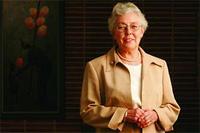Supreme Court Secrets
The Globe and Mail reports that Justice Minister Irwin Cotler has already handed over to his advisory committee the names of six candidates for the next Supreme Court vacancy:
At its first meeting in Ottawa's Chateau Laurier hotel Monday, the nine-member committee was told by Mr. Cotler that it has until Nov. 18 to come up with its short list, from which the minister will choose the new judge for the country's top court. He wants to have a new person in place by the time Mr. Justice John Major retires at Christmas.
The candidates' names are confidential, and the committee members had to sign written agreements that they will not spill the beans.
The advisory committee has a slightly different makeup than what was first announced last week. Former British Columbia Court of Appeal chief justice Allan McEachern stepped down from the group “for personal reasons,” Justice Department official Francois Giroux said. He was replaced by Constance Glube, a former chief justice of the Nova Scotia supreme court.
 Apart from Justice Glube (right), who was a last-minute selection, I've got brief profiles of the committee members here.
Apart from Justice Glube (right), who was a last-minute selection, I've got brief profiles of the committee members here.Some extra information on Justice Glube: she's also part of the advisory committee helping Justice Gomery draft recommendations for the second part of his report.
While the committee's role is essentially limited to cutting Mr. Cotler's list in half, if the group feels strongly that an important person has been left out, it can ask the minister to add another name.
Otherwise, the committee is on its own until it comes up with the short list, and will have no contact with the minister until it finishes the job, Mr. Giroux said. “We're hands off from now on.”
Now comes one deceptively simple question: Who's on the short list?
This is the problem. The Justice Ministry did say it was going to be secret, back when they announced the process. And there's been some speculation already in the news. But that's all it can ever be: speculation. We don't know if these names even made the half-dozen that Cotler gave to the committee. And speculation is potentially more damaging than knowing the real thing.
Should we, at this stage? I think so, because if we knew who's on the short list, we can research their previous judgments and learn their way of thinking, their educational background. And by extension, we would know what kind of person the Martin government would like to see on the Supreme Court.
Now, certainly we can understand why the government wants to keep the list a secret. After all, if you were a judge and your name were on the list, and you were rejected, you wouldn't necessarily want that fact known. But rejection didn't exactly hurt Robert Bork, did it? And it certainly shouldn't hurt whoever's on the list.





<< Home